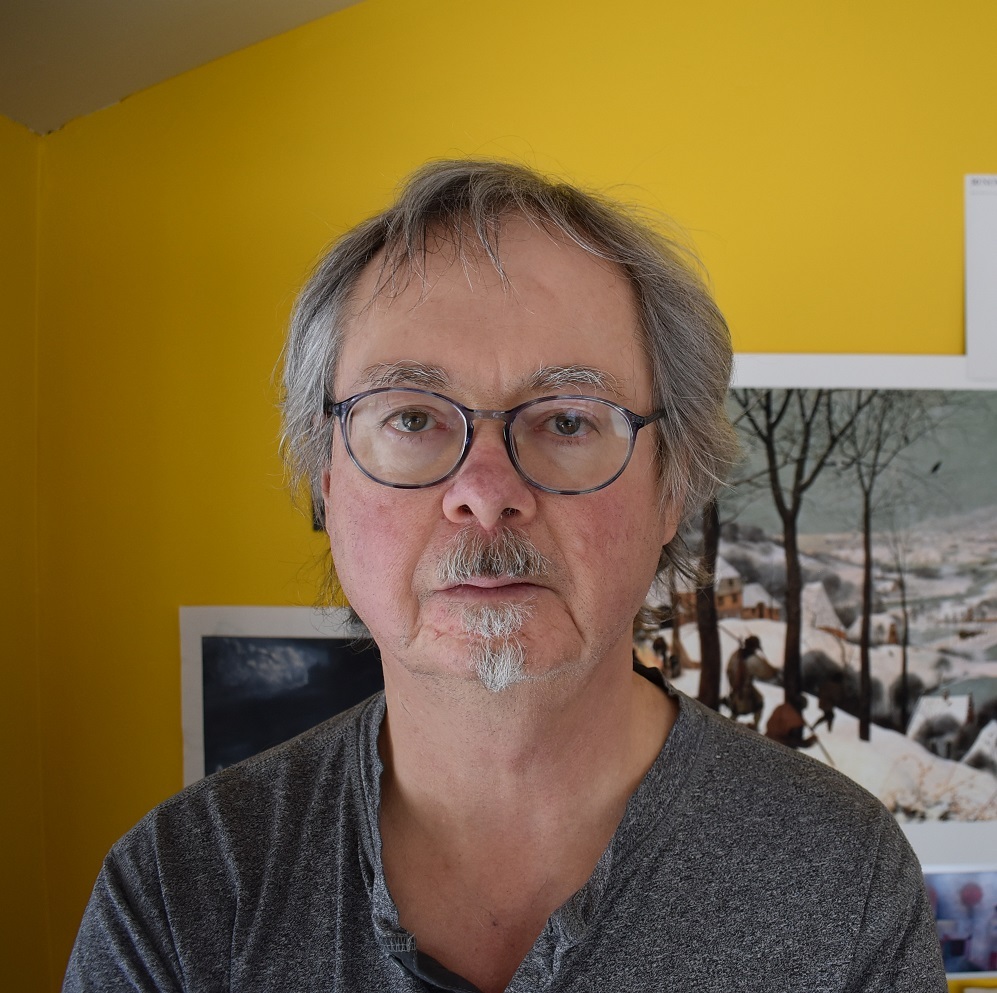2023 Winners
Congratulations to the winners of the 2023 Hybrid Grain Contest!
1st Prize ($1000)
Graeme Dyck
"[Assorted Fragments from the Post-Information Transitional Period (Bin 4)]"
2nd Prize ($750)
kerry doyle
"A broken corona"
3rd Prize ($500)
Serena Lukas Bhandar
"arc"
Honourable Mention
dee Hobsbawn-Smith
"Darkness"
1st Prize ($1000)
Lauren Griffin
"Frost"
2nd Prize ($750)
Tazi Rodrigues
"Ghost Tones"
3rd Prize ($500)
Liz Huntly
"Hornworms"
Honourable Mentions
Elizabeth Nash
"Unbecoming"
Liz Huntly
"Curriculum Vitae A Herstory of Dis Ease"
Judges' Comments
 Michael Trussler
Michael Trussler
It’s fairly simple to create a hybrid text: a wrecking bar, blowtorch, camera, a keen sense of the lyric—what it provides and what it lacks—not to forget metaphysical duct tape and dust: these are some of the most rudimentary tools. But it also means to aim for the sui generis, and I believe the winning entries succeed. Going over all the entries, I was delighted to see how adventurous many writers are, not simply in terms of formal experimentation, but how vividly they explore places in the heart and mind and some other mode of being that’s elsewhere. Certainly, the various entries are intellectually demanding, rigorous, and fortunately quite baffling on occasions, too—but what brings all the entries together, perhaps surprisingly, is their tenderness. It seems that the desire to move beyond a single form, to yoke different kinds of writing, thought, and image together, has at its core the need to understand the fragility and weird particularity of our times.
First Place – “[Assorted Fragments from the Post-Information Transitional Period (Bin 4)]”
Hallucinogenic philosophy, richer than chocolate, as earnest as a ferris wheel, by turns hilarious and compassionate. Also gnomic and wonderful fun. This intricately experimental piece blends earnest intellectual exploration with parody, very often in the same sentence. A mélange of styles—verse, music score, prose, diagram—that asserts that boundaries exist for the discipline involved in transgressing them.
Second Place – “A broken corona”
A wonderfully complicated concrete poetry-encyclopedia-image text that stays with you. Meaning embedded inside a cascade of more meanings. Philosophically adventurous and very engaging, this piece contains both immediacy and distance, precision and abstraction. This text understands that statements are really questions and questions tip into what can no longer be said. It’s time to forget what you thought you knew and learn to bend.
Third Place – “arc”
An erasure poem epic in scope that poignantly blends ecological concerns with long grief. Geological lyricism that manages gentleness alongside dexterous word-play. The essence of defamiliarization. Somehow this piece manages to create colours that we’ve sensed but never seen. This work shows the tectonic landscape that lives beneath words, words taken together or individually and when these plates shift, history is revealed, its impossible shards. More resilient: language as geology as metamorphosis.
 Chelene Knight
Chelene Knight
What a wonderful and immersive experience it was to read through this year’s submissions. It’s always a difficult task to select the winning pieces, but still a joyful experience.
First Place – “Frost”
“Frost” is an exquisite poem filled with intentionally vivid imagery and metaphor. Personification breathes life into every element, making the verses pulse. It is masterful in its use of enjambment. The lines flow seamlessly from one to the next, much like the uninterrupted rhythm of life itself. “My breath clouds/ the looming apple-sliced/ moon spitting/ her star seeds”—these lines stand out as a perfect example of the poem’s brilliance. Here, the poet paints a picture of the moon not as a distant celestial body, but as a living being, actively involved in the act of creation. This poem reminds me what is possible with poetry and that it can elevate the ordinary into the extraordinary. It speaks to the heart of what it means to be alive, to be connected to the world, and to find wonder in the simplest of things.
Second Place – “Ghost Tones”
This prose piece stands out as a truly unique work, a testament to the author’s exceptional talents in the realm of language and storytelling. “Ghost Tones” distinguishes itself with the author’s discerning gaze, which explores the depths of human experience. The imagery crafted is nothing short of vivid and evocative, allowing readers to inhabit the story’s world with remarkable clarity. One of the most notable aspects is its exploration of identity. The author navigates the intricacies of this complex theme with deftness. The work is also firmly grounded in its sense of place, rendering the setting as a character in itself. It is a carefully crafted braid, each strand woven with precision. It’s engaging and thought-provoking.
Third Place – “Hornworms”
This prose poem is an exploration of the mysteries that surround life after death. “Hornworms” seamlessly melds imagination, honesty, and speculation into a harmonious chunk of prose. The concrete imagery woven throughout the poem is a feast. Each sentence effortlessly leads to the next, a journey that feels both familiar and entirely new. This prose poem is a gift of introspection and exploration. It encourages us to ponder the great mysteries of existence with an open heart and an open mind. It’s a beautiful rendition of questioning what happens after we die, and it does so with grace and eloquence.




